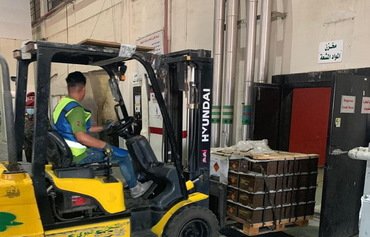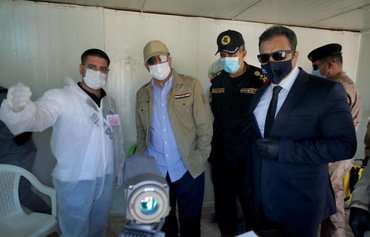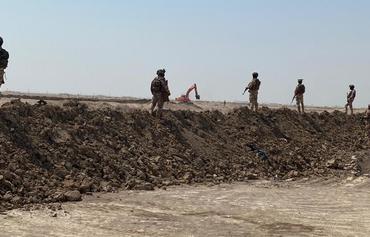Iraq's Border Ports Authority on Tuesday (August 18th) announced record financial revenues from customs duties a month after the Iraqi army tightened security at all border crossings and ports of entry.
The plan to tackle corruption, smuggling and illegal activities at land border crossings and seaports saw hundreds of millions in increased revenue from customs duties on imported goods, said the authority's director, Omar al-Waeli.
The authority rolled out a new plan to take direct control of the ports and impose the rule of law and state authority on the order of Prime Minister Mustafa Kadhemi, he told Diyaruna.
Army forces were deployed to protect all 22 federal ports of entry, which include five airports, six seaports and 11 land border crossings, al-Waeli said, thereby providing "a safe and law-abiding environment at the ports".
![Illegal trailers are removed from the Shalamcheh border crossing with Iran in Iraq's Basra province on August 7th. [Photo courtesy of the Border Ports Authority]](/cnmi_di/images/2020/08/19/25586-Iraq-Iran-border-600_384.jpg)
Illegal trailers are removed from the Shalamcheh border crossing with Iran in Iraq's Basra province on August 7th. [Photo courtesy of the Border Ports Authority]
"No one is allowed any more to let in individuals who do not meet the legal requirements," he said, adding that work procedures "are tightly monitored in a way that does not leave any opportunity for violation of rules and regulations".
Port employees are now able to carry out their work without pressure, and they are protected while performing their jobs and outside of work hours, he said.
The steps taken to assert control over the Iraqi ports has provided the state treasury with unprecedented financial revenue from customs duties on imported goods, al-Waeli said.
Revenues amounted to around $420 million, according to media reports.
Ports Authority personnel, with the help of security authorities, have stopped a total of 1,200 customs violations, including forgery, smuggling, changing of goods classification, and manipulation of imported quantities, he added.
The government also has a genuine will to tackle any unofficial border ports, he said, referring to unsanctioned crossings with neighbouring countries like Iran.
New measures to secure hazardous materials
In new measures to protect its ports and airports in the wake of the August 4th blast at the Beirut port, Iraq announced it will create an inventory of all hazardous materials at ports and airports, AFP reported.
An emergency committee chaired by the head of Iraq's General Authority of Customs said it had been tasked with carrying out the work, with the aim of avoiding "any repetition of what happened in Lebanon" in Iraq, the panel said.
The huge blast that caused widespread destruction across the Lebanese capital was triggered by 2,750 tonnes of ammonium nitrate fertiliser that had been stored in the city's port for years.
Port authorities had stored it in a rundown warehouse with cracks in its walls, several security officials said.
Security forces launched an investigation in 2019 after the warehouse reportedly started to exude a strange odour, and concluded that the "dangerous" chemicals should be removed, but no action was taken.

![An armoured vehicle belonging to the Iraqi army is seen near the Zarbatiya crossing with Iran on July 27th, as part of a plan to impose the rule of law at all border crossings. [Photo courtesy of the Iraqi Ministry of Defence]](/cnmi_di/images/2020/08/19/25585-Iraq-Zarbatiya-border-600_384.jpg)






